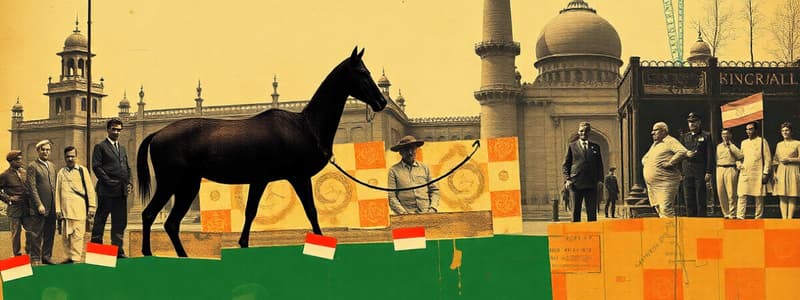Podcast
Questions and Answers
What significant change occurred to the East India Company in 1765?
What significant change occurred to the East India Company in 1765?
- It was granted the rights over revenue and civil justice in Bengal, Bihar, and Orissa. (correct)
- It lost its charter from Queen Elizabeth I.
- It received exclusive trading rights from the British Crown.
- It transformed into a military power.
Which event directly led to the British Crown assuming direct governance over India?
Which event directly led to the British Crown assuming direct governance over India?
- The sepoy mutiny of 1857. (correct)
- The signing of the Treaty of Amritsar.
- The conclusion of World War II.
- The formation of the East India Company.
What role did the Constituent Assembly play shortly after India's independence?
What role did the Constituent Assembly play shortly after India's independence?
- It was involved in international diplomacy for India.
- It established the first government of independent India.
- It was tasked with drafting the Constitution of India. (correct)
- It was responsible for the economic planning of post-colonial India.
Which feature of Indian polity has its roots in British rule?
Which feature of Indian polity has its roots in British rule?
When did India formally gain independence from British rule?
When did India formally gain independence from British rule?
What were the two major phases of British rule in India referred to?
What were the two major phases of British rule in India referred to?
What was the main function of the East India Company when it first arrived in India?
What was the main function of the East India Company when it first arrived in India?
Which Queen granted the East India Company the exclusive right to trade in India?
Which Queen granted the East India Company the exclusive right to trade in India?
Flashcards
East India Company
East India Company
British trading company granted exclusive rights to trade in India by Queen Elizabeth I in 1600.
Diwani Rights
Diwani Rights
Rights over revenue and civil justice in Bengal, Bihar, and Orissa, acquired by East India Company in 1765.
Sepoy Mutiny
Sepoy Mutiny
Event that led to the British Crown taking direct control of India in 1858.
Crown Rule
Crown Rule
Signup and view all the flashcards
Constituent Assembly
Constituent Assembly
Signup and view all the flashcards
Indian Independence
Indian Independence
Signup and view all the flashcards
Indian Constitution
Indian Constitution
Signup and view all the flashcards
British Influence on India
British Influence on India
Signup and view all the flashcards
Study Notes
British Rule in India
- The British East India Company arrived in India in 1600 as traders, granted exclusive trading rights by Queen Elizabeth I.
- In 1765, the Company gained control over revenue and civil justice in Bengal, Bihar, and Orissa ("diwani"), marking the beginning of its territorial power.
- The Sepoy Mutiny in 1858 led the British Crown to take direct control of Indian governance.
- This British rule lasted until India's independence on August 15, 1947.
Post-Independence Constitutional Development
- India's independence necessitated a constitution, prompting the formation of a Constituent Assembly in 1946.
- The Indian Constitution was adopted on January 26, 1950.
- Many aspects of India's Constitution and political system stem from British rule in India.
- Key events during British rule shaped the legal framework of government and administration in British India.
- This framework significantly influenced India's constitution and political system.
British Rule Periods
- Company Rule (1773-1858): This period saw the East India Company's increasing control over Indian territories.
- Crown Rule (1858-1947): The Crown assumed direct control of governance after the Sepoy Mutiny.
Studying That Suits You
Use AI to generate personalized quizzes and flashcards to suit your learning preferences.




